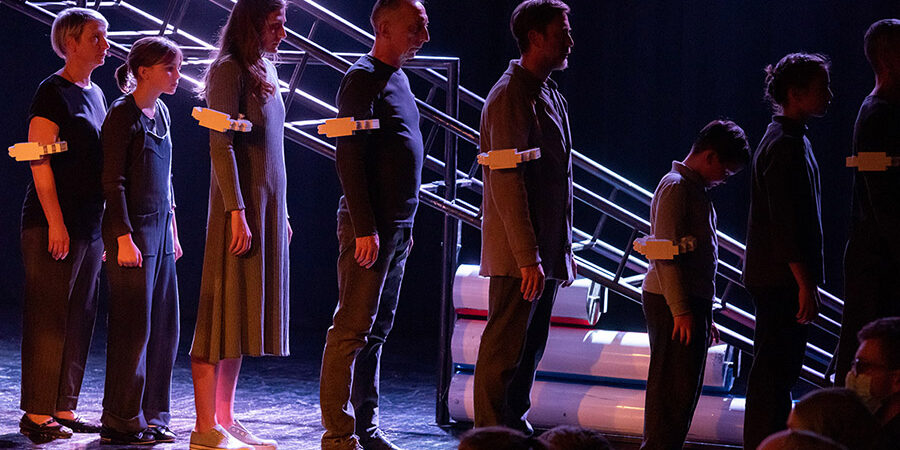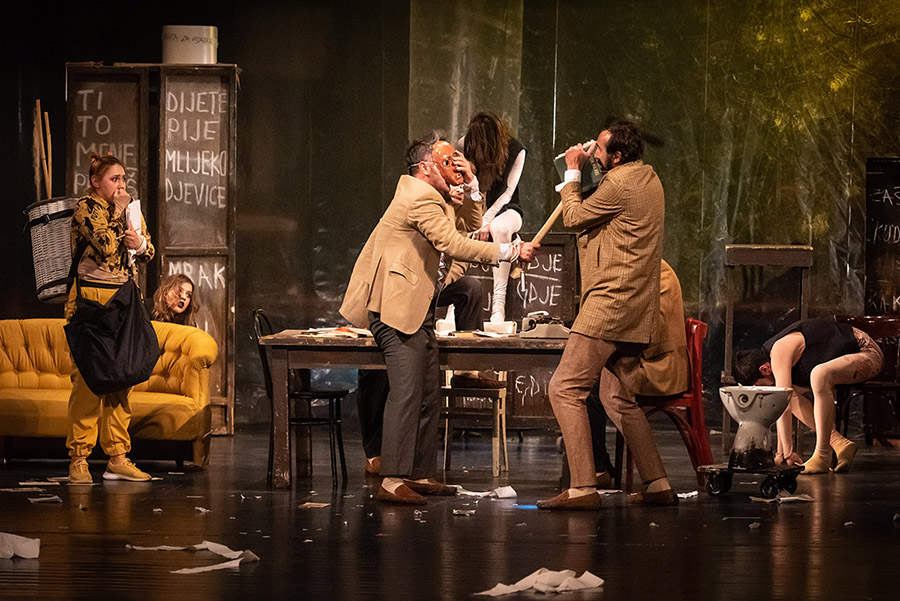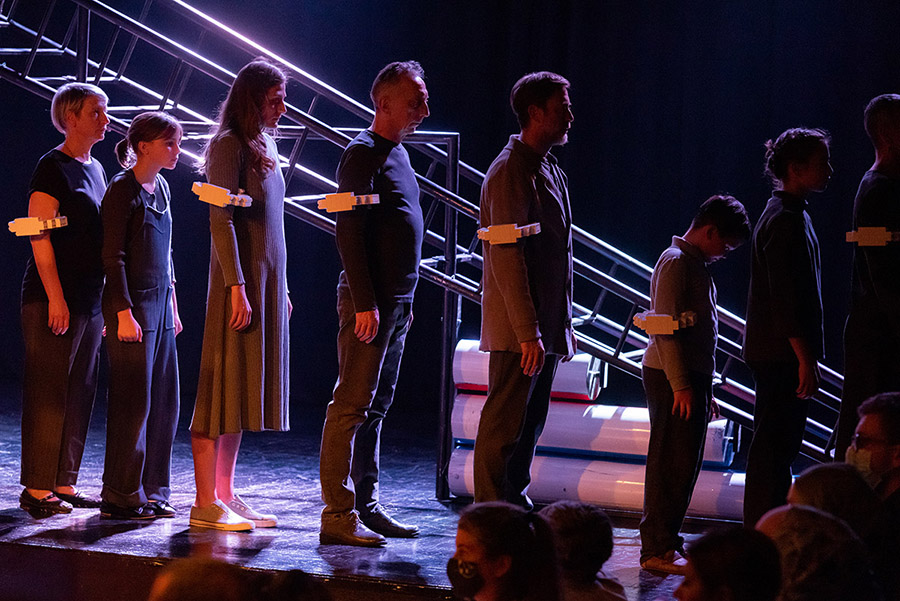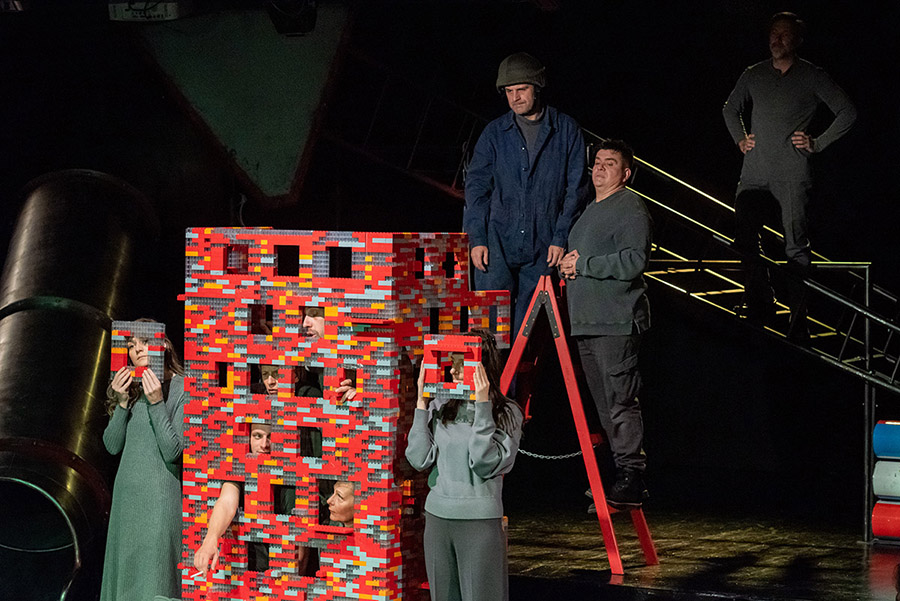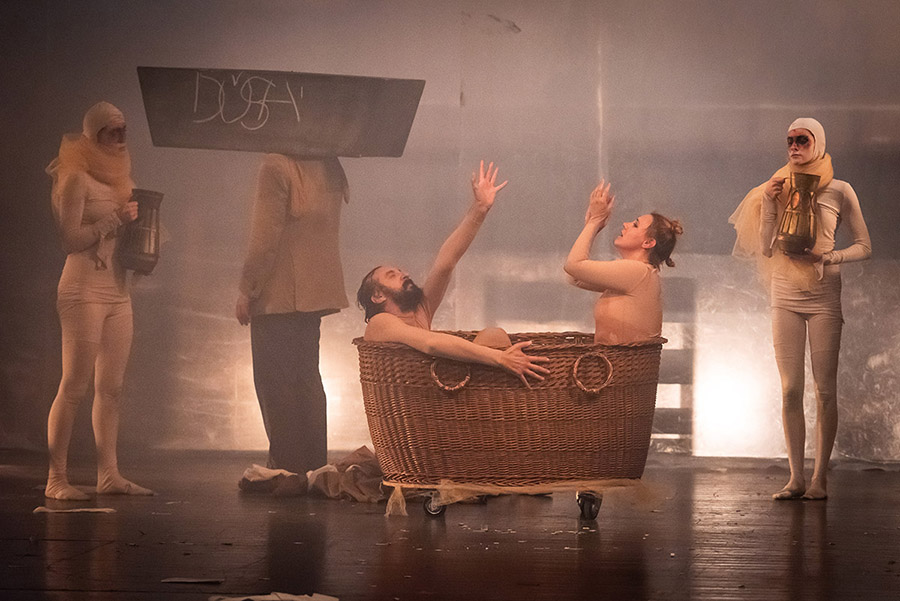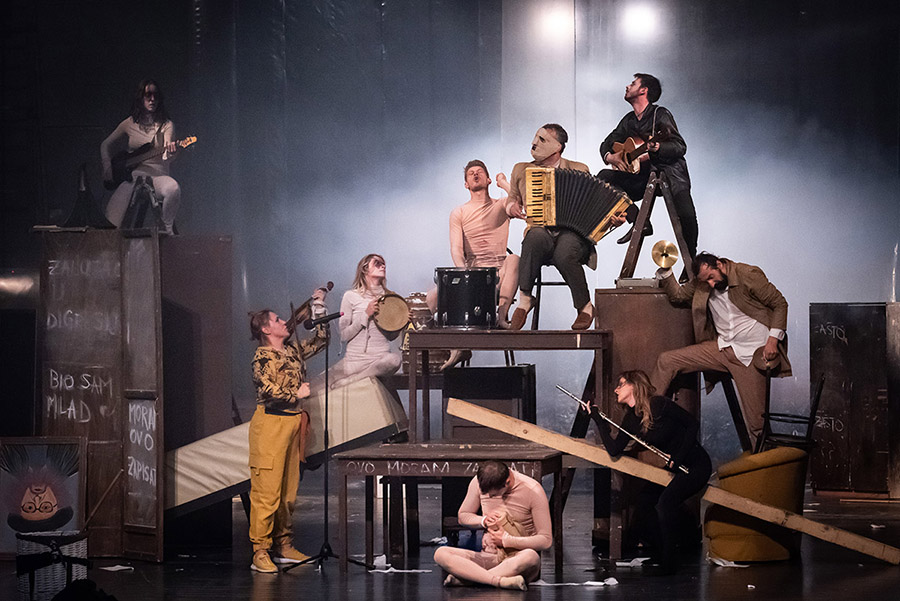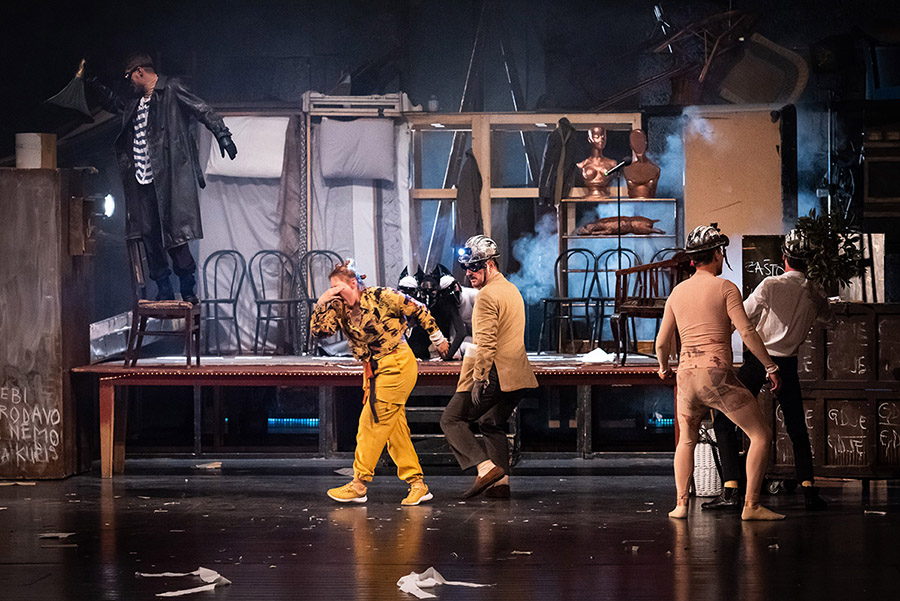The 61st edition of the MESS festival took place in Sarajevo from 1st-7th October, 2021. Mladen Bićanić reports on this year’s programme.
The motto of the 61st International Theatre Festival MESS – “Show must go on” is loaded with meaning: it is a sigh of relief that the festival, after last year’s Covid-19 standstill, finally opened to present six live performances on the Sarajevo theatres’ stages and two virtual ones on the MESS YouTube channel. These performances were from Ireland, France, Germany, and Rwanda, as well as from the region – from Varaždin, Croatia, and Tuzla and Sarajevo, Bosnia and Herzegovina.
The festival was programmed by Dino Mustafić and Nihad Kreševljaković, the MESS Director. Show Must Go On” was also the name of the MESS opening performance at the National Theatre in Sarajevo. It took the form of a loud cry of resistance and rebellion against the closing of theatres and the relocation of performances into the online world and onto the virtual stages. The very fact that they were able to open the festival at all is testament to theatre’s unwillingness to surrender, to persevere in its mission to transform the world, while being aware that it cannot change the world, continuing to ask questions about its meaning and the place humans have in it.
Before the main festival started, Moby Dick by the Italian company Teatro dei Venti, conceptualised and directed by Stefano Te in a dramatic adaptation by Giulio Sonno, was performed on the street in front of the National Theatre in Sarajevo in early September. This was an attractive and lavish production based on Herman Melville’s novel, the saga of Captain Ahab and his senseless search for the monster that changed his life cloaked in luxurious theatrical attire, dance and music.
The festival proper opened with Chekhov’s First Play by Irish company Dead Centre. Though the work of Chekhov is constantly researched and staged throughout the world, what happens when one reaches for his hitherto unperformed dramatic manuscript? Co-directors Bush Moukarzel and Ben Kidd probably asked themselves this question when they reached for this lost and unperformed text. Chekhov wrote the play at the age of 19 and they showed that he was, despite disputes and doubts, very much alive. This performance takes the form of a magical, mysterious walk through the playwright’s entire dramatic opus, the themes, ideas and motives that we encounter in all the plays he called comedies –employing all these laments with an inevitable dose of irony and also humour, always firmly grounded in his work. As Kidd says, one should never forget that one of the essential traits of Chekhov is that he possesses an exceptional clownish quality which he brings into every scene, no matter how sad or tragic – a liberating tone of humour and serenity.
Artist, choreographer and director Josef Nadj came to MESS with Omma by the French Atelier 3 + 1. Primarily, it is a dance exhibition performed by eight dancers, with whom he is working for the first time, from Africa: originally from Mali, Senegal, Ivory Coast, Burkina Faso, Democratic Republic of Congo and Republic of Congo. They ingeniously bring to the stage his idea of the creation of the world, of everything animate and inanimate. The barefoot, half-naked bodies jump, spasm, scream. Nadj does not hesitate from using the performers’ voices, in addition to movement and the body. The piece begins with exhalation and inhalation; their voices sometimes sound like those of some strange, extinct beings, every muscle, every blink betrays their devotion to the game. The effect is almost hypnotic, a dance oratorio about the origin of the world, presented in spasming bodies and the rhythm of the human heart. Forgotten rites of the ancient past, the beginnings of the art of theatre, the vanished rituals of our ancestors, the myths of lost civilizations. The cries of the rainforest come to life, demons from our innermost fears crawl and grovel; it is a piece of pure energy but also contains bursts of hope. At the very end of the performance, a small red thread appears amid the blackness and chaos – a sign of life which, like theatre, does not surrender.
The festival programme continued with Bojana Vidosavljević and Emina Omerović’s adaptation of Orhan Pamuk’s Snow was directed by Dino Mustafić and produced by the Sarajevo National Theatre. The novel is a complex work divided into 44 chapters.
Translated by Marta Andrić, this huge narrative required great skill and talent to translate into a dramatic expression. The novel, as well as the drama, is a magnificent panorama of ideas, thoughts and views through which many points of our age intersect. Darkness covers it: totalitarianism, the power of religion or ideology, primitivism, backwardness and blindness, justifying crimes in the name of the higher good. But Pamuk does not bypass the brighter side of our lives: the role of love, the place of and reason for poetry, art in general in the life of an individual and in society. At the same time, it is a clever portrait of a modern, intellectual, poet, dervish and stateless man, a man crucified between East and West, love and faith, who does not belong to anyone and is appropriated by everyone.
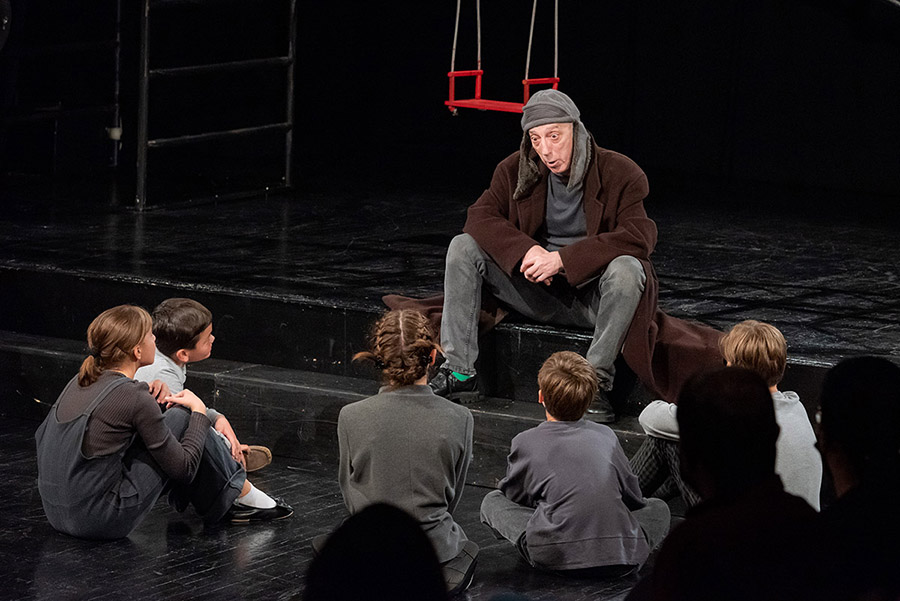
Schindler’s Lift. Photo: Velija Hasanbegović
The only contemporary Bosnian text performed at this year’s festival was Croaking written by Almir Bašović, directed by Aleš Kurt, and produced by the National Theatre in Tuzla. Bašović, who is well-known in Bosnian drama, here refers to Aristophanes and The Frogs, however, this ancient drama reference is only a path into his specific approach to drama and theatre. This is a performance created for true “theatre lovers”. He builds upon some of the fundamental values of Aristophanean comedy, elaborating on them further to illuminate the age in which he lives and writes. The heroes of Croaking, in the very lucid staging by Aleš Kurt, replace the earthly world with the underworld; they go there to find something that is not of this world with the goal of changing and improving as much as possible the only world destined for them. Kurt, a theatre director with a rich theatrical imagination, ingeniously handles this game of styles, genres and techniques in a performance composed of unpredictable twists, unusual plots and stage illusions worthy of Houdini, with extraordinary choreography by Amila Terzimehić who respects the very young and energetic ensemble.
One of the most eagerly awaited performances at the 61st MESS was the staging of the short but strong and extremely powerful novel Schindler’s Lift by Darko Cvijetić’s, which takes us to the dark and terrible times of the not-so-distant 1990s The performance premiered under the same name at the Chamber Theatre 55 in Sarajevo, adapted and directed by Kokan Mladenović; the dramaturge was Vedran Fajković. It is a strong and multi-layered ensemble-performance that seamlessly connects various fragments of Cvijetić’s poetic-dramatic prose. The ensemble fully lives out the performance’s intention to awaken the audience, to warn them and draw them into its world: the world of an apartment building in Prijedor, in what was Yugoslavia, in the time when no one thought that it could collapse, disintegrate, take its inhabitants and itself into the abyss. In that apartment building, whose floors are connected by a lift produced by Schindler, previously unimaginable transformations and changes will take place during the war, some people will take on inhuman qualities, some non-existent hatreds, quarrels and conflicts, neighbour will attack neighbour, just because he is of another religion, or nationality, or simply perhaps because he is not liked for some reason, because of some word uttered along the way without any ill intent.
At the same time, Schindler’s Lift is a performance that very explicitly shows how something that is primarily poetic, even in the form of prose, can be very impressively and fluently translated into drama – of course, these elements of drama were already part of Cvijetić’s poetic novel, but it took a very sensitive directorial nerve and a committed cast to stage it.
The performance Between the Walls also speaks about the horrors of war, from a completely different point of view. It premiered in Varaždin, Croatia, in the art group GLLUGL, and is a project of the Sarajevo director Selma Spahić, her visual concept and directing. The text was created in collaboration of all participants of the performance who are also its actors: Filip Eldan, Nikša Eldan, Katarina Arbanas, Tamara Kučinović, and director Spahić.
The protagonists take us to a different war, to the first days of the Independent State of Croatia, the Nazi-creation of World War II. The setting is a family in a provincial town in the 1940s. Fear, silence and stillness reign. Very intelligent, visually extremely impressive, using two plans, two levels of performance, one cinematic, on the wall behind the stage and the other theatrical, on the stage directly in front of that wall, the performance communicates from today the dilemmas about that time. A few sentences uttered in the very beginning seem to be a trademark of the performance: “… it is easy here between the walls, but outside… anything can happen on the street, we should be quiet…” They contain the fundamental, load-bearing beam on which the piece is built – things are good in the house, we are protected there, nothing can happen to us, we just shouldn’t interfere or get involved in what is happening outside, outside these walls that hide and protect us, because an abyss will open, chaos ensue that will sweep us and everything around us. Thus, the performance enters the space of conflict, throws its strongest card: how someone continue to live as if nothing is happening, without any attempt to oppose the violence, insanity and crime there in front of them, in which the closest neighbours are killed (by the way, these are the same “close neighbours” with whom the tenants share Schindler’s lift every day, imprisoned in the Prijedor apartment building).
How is it possible that we continue to not resist, to not condemn what is happening around us – say, today, to unfortunate migrants, to refugees we show no regard for – and to so easily condemn someone from the not-so-distant past who behaved just as we do today, neglecting the evil happening all around and the people disappearing without a trace? This is also one of the big questions that Between the Walls, raises in a theatrically grounded and accurate manner.
The MESS festival did not forget its youngest audience. This is an extremely important segment for the future of every theatre festival, as it educates new audiences and welcomes new visitors. There were four children’s performances on stage and one online, from Belgrade, Mostar, and Zenica. “The show must go on” is the call of a live theatre, a theatre that lives off contact with an audience that it confronts with reality through illusion – as MESS has been doing diligently from its beginnings.
Mladen Bićanić was born 1949 in Bjelovar, in the former Yougoslavie, now Croatia, He worked for 15 years at Radio-Tuzla, and for the last 20 years, as a freelancer, at BHT 1 in Sarajevo. He writes theatre criticism for Oslobodjenje, in Sarajevo, and has published two books of his critical texts.

